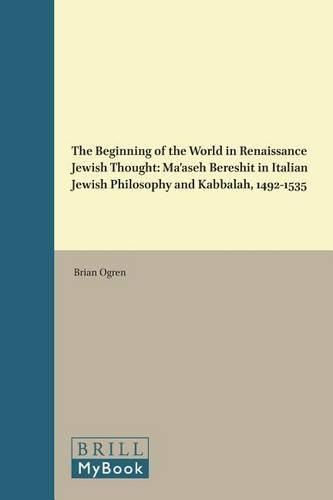Readings Newsletter
Become a Readings Member to make your shopping experience even easier.
Sign in or sign up for free!
You’re not far away from qualifying for FREE standard shipping within Australia
You’ve qualified for FREE standard shipping within Australia
The cart is loading…






In The Beginning of the World in Renaissance Jewish Thought, Brian Ogren offers a deep analysis of late fifteenth century Italian Jewish thought concerning the creation of the world and the beginning of time. Ogren’s book is the very first to seriously juxtapose the thought of the great Jewish thinker Yohanan Alemanno, Alemanno’s famed Christian interlocutor, Giovanni Pico della Mirandola, the important Iberian exegete active in Italy, Isaac Abravanel, and Abravanel’s renowned philosopher son Judah, known as Leone Ebreo. By bringing these thinkers together, this book presents a new understanding of early modern uses of Jewish texts and hermeneutics. Ogren successfully demonstrates that the syntheses of philosophy and Kabbalah carried out by these four intellectuals in their quests to understand the beginning itself marked a new beginning in Western thought, characterized by simultaneous continuity and rupture.
$9.00 standard shipping within Australia
FREE standard shipping within Australia for orders over $100.00
Express & International shipping calculated at checkout
In The Beginning of the World in Renaissance Jewish Thought, Brian Ogren offers a deep analysis of late fifteenth century Italian Jewish thought concerning the creation of the world and the beginning of time. Ogren’s book is the very first to seriously juxtapose the thought of the great Jewish thinker Yohanan Alemanno, Alemanno’s famed Christian interlocutor, Giovanni Pico della Mirandola, the important Iberian exegete active in Italy, Isaac Abravanel, and Abravanel’s renowned philosopher son Judah, known as Leone Ebreo. By bringing these thinkers together, this book presents a new understanding of early modern uses of Jewish texts and hermeneutics. Ogren successfully demonstrates that the syntheses of philosophy and Kabbalah carried out by these four intellectuals in their quests to understand the beginning itself marked a new beginning in Western thought, characterized by simultaneous continuity and rupture.